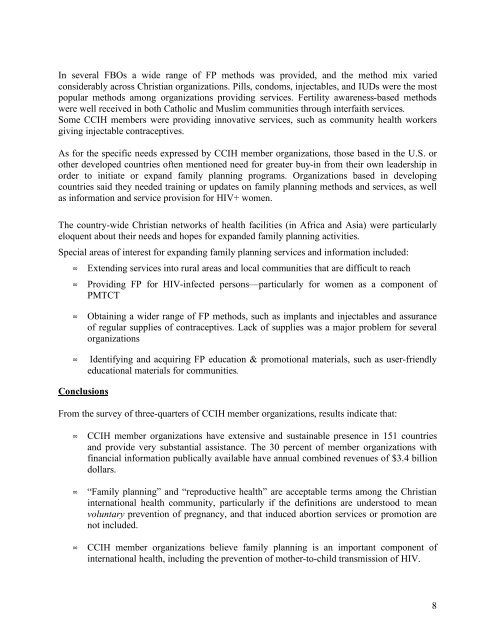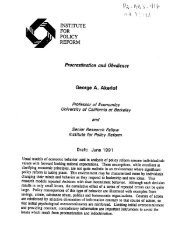International Family Planning: Christian Actions and Attitudes
International Family Planning: Christian Actions and Attitudes
International Family Planning: Christian Actions and Attitudes
You also want an ePaper? Increase the reach of your titles
YUMPU automatically turns print PDFs into web optimized ePapers that Google loves.
In several FBOs a wide range of FP methods was provided, <strong>and</strong> the method mix varied<br />
considerably across <strong>Christian</strong> organizations. Pills, condoms, injectables, <strong>and</strong> IUDs were the most<br />
popular methods among organizations providing services. Fertility awareness-based methods<br />
were well received in both Catholic <strong>and</strong> Muslim communities through interfaith services.<br />
Some CCIH members were providing innovative services, such as community health workers<br />
giving injectable contraceptives.<br />
As for the specific needs expressed by CCIH member organizations, those based in the U.S. or<br />
other developed countries often mentioned need for greater buy-in from their own leadership in<br />
order to initiate or exp<strong>and</strong> family planning programs. Organizations based in developing<br />
countries said they needed training or updates on family planning methods <strong>and</strong> services, as well<br />
as information <strong>and</strong> service provision for HIV+ women.<br />
The country-wide <strong>Christian</strong> networks of health facilities (in Africa <strong>and</strong> Asia) were particularly<br />
eloquent about their needs <strong>and</strong> hopes for exp<strong>and</strong>ed family planning activities.<br />
Special areas of interest for exp<strong>and</strong>ing family planning services <strong>and</strong> information included:<br />
• Extending services into rural areas <strong>and</strong> local communities that are difficult to reach<br />
• Providing FP for HIV-infected persons—particularly for women as a component of<br />
PMTCT<br />
• Obtaining a wider range of FP methods, such as implants <strong>and</strong> injectables <strong>and</strong> assurance<br />
of regular supplies of contraceptives. Lack of supplies was a major problem for several<br />
organizations<br />
• Identifying <strong>and</strong> acquiring FP education & promotional materials, such as user-friendly<br />
educational materials for communities.<br />
Conclusions<br />
From the survey of three-quarters of CCIH member organizations, results indicate that:<br />
• CCIH member organizations have extensive <strong>and</strong> sustainable presence in 151 countries<br />
<strong>and</strong> provide very substantial assistance. The 30 percent of member organizations with<br />
financial information publically available have annual combined revenues of $3.4 billion<br />
dollars.<br />
• “<strong>Family</strong> planning” <strong>and</strong> “reproductive health” are acceptable terms among the <strong>Christian</strong><br />
international health community, particularly if the definitions are understood to mean<br />
voluntary prevention of pregnancy, <strong>and</strong> that induced abortion services or promotion are<br />
not included.<br />
• CCIH member organizations believe family planning is an important component of<br />
international health, including the prevention of mother-to-child transmission of HIV.<br />
8

















